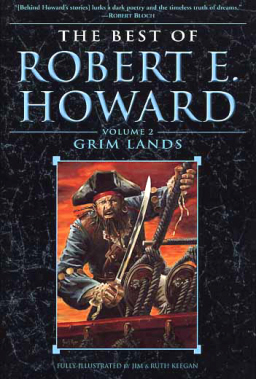Worldcon Wrap-up
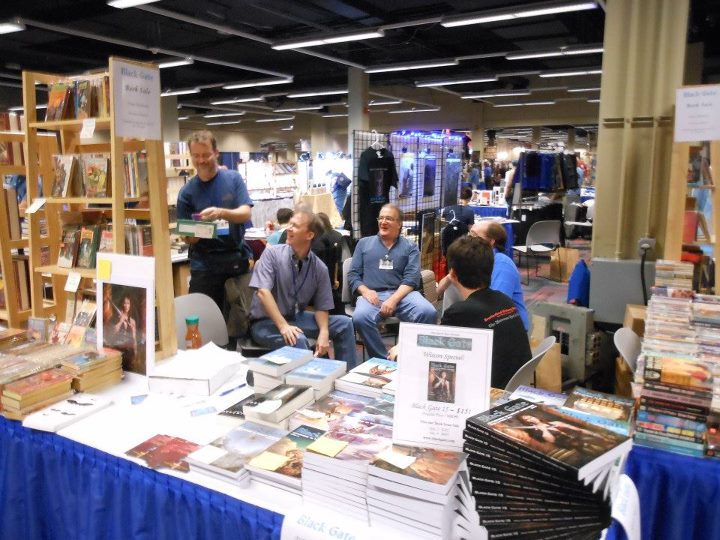
I was almost to Chicago last Thursday when I realized I’d gotten so wrapped up in the audio book of The Name of the Wind that I’d missed my turn. Fortunately, I found another way to Interstate 90 and the Hyatt Regency. And when I finally reached the dealer’s room, I was able to lodge a personal complaint with Patrick Rothfuss himself for writing so well that I got distracted.
It wasn’t long ago that I’d arrive at a convention and be surrounded by strangers or literary luminaries I was too nervous to approach. When I turn up these days, there are still a lot of strangers, but there are plenty of familiar faces as well. Before I’d even checked in, I bumped into Tom Doyle, and shortly after registering my complaint with Patrick Rothfuss, I was welcomed by Arin Komins and Rich Warren to their used books booth, Starfarer’s Dispatch.
Rich showed me a rare Harold Lamb book, then, as I noticed it contained an insert about Lamb I had no knowledge of, he handed me a CD with scans of the material. That was incredibly kind of him. I then signed a complete set of the Harold Lamb books I’d edited and personalized Arin’s copy of The Desert of Souls, which she had liked so much that I gifted her with an ARC of The Bones of the Old Ones.
Purely by chance, I kept down the aisle to the left and came instantly to the Black Gate booth where John O’Neill, (now with beard) occupied a booth surrounded by old but well-cared for paperbacks and stacks of Black Gate magazines. The booth remained a gathering spot for friends, acquaintances, and staff members throughout the convention, which is why the talented Peadar Ó Guilín and Donald Crankshaw were manning the booth with O’Neill. I’d never had the chance to meet Peadar before, but his gentle humor put me immediately at ease. We chatted for a while and then James Enge wandered up with his brother Patrick. While the Mighty Enge was settling into the room we shared, I retrieved a box of The Desert of Souls hardbacks to sell at the Black Gate booth. (We sold ’em all before the end of the convention!)
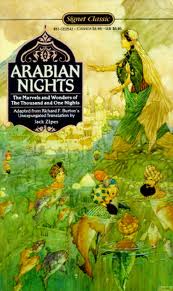
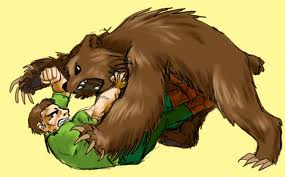
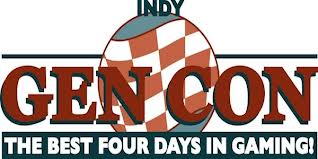 Tomorrow, I’m headed off to GenCon for a brief stay. My schedule this year has been a little hectic, what with a couple of book promotions, some revisions, some drafting, and an unexpected knee surgery, so I didn’t plan a whole lot of convention time. Now I’m regretting it, because GenCon is a lot of fun, and being there just for Saturday is going to feel a little like seeing the pie and only getting to eat one cherry.
Tomorrow, I’m headed off to GenCon for a brief stay. My schedule this year has been a little hectic, what with a couple of book promotions, some revisions, some drafting, and an unexpected knee surgery, so I didn’t plan a whole lot of convention time. Now I’m regretting it, because GenCon is a lot of fun, and being there just for Saturday is going to feel a little like seeing the pie and only getting to eat one cherry.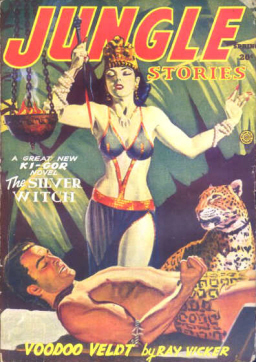
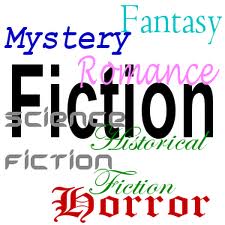 It’s a lot easier for me to be generous about other genres than it used to be. I’m trying to decide if that has something to do with me mellowing with age, or if it’s because there’s a whole lot more sword-and-sorcery available than there was ten years ago … or if it’s simply that I don’t feel shut out anymore now that I’m writing sword-and-sorcery stories for a living.
It’s a lot easier for me to be generous about other genres than it used to be. I’m trying to decide if that has something to do with me mellowing with age, or if it’s because there’s a whole lot more sword-and-sorcery available than there was ten years ago … or if it’s simply that I don’t feel shut out anymore now that I’m writing sword-and-sorcery stories for a living. I’m a writer, not a psychotherapist. As an adventure writer, though, I spend an awful lot of time thinking about heroism and villainy. I think that we forget too easily that real heroes exist as well as real villains. We remember the underwear bomber, but how many of us recall the name of the Dutch man who leapt from several rows back to take him down? In the aftermath of the attack on Congresswoman Giffords, we heard courageous tales of people throwing themselves in front of their friends and loved ones to protect them. Many of them died when they did so. As the events unfold after this most recent tragedy, we are certain to learn of people in the cinema who risked or even sacrificed their lives for their friends and loved ones. We know already that policemen risked their lives to advance into who knew what to find and stop the man (or men – they didn’t know) who had committed this horrible crime.
I’m a writer, not a psychotherapist. As an adventure writer, though, I spend an awful lot of time thinking about heroism and villainy. I think that we forget too easily that real heroes exist as well as real villains. We remember the underwear bomber, but how many of us recall the name of the Dutch man who leapt from several rows back to take him down? In the aftermath of the attack on Congresswoman Giffords, we heard courageous tales of people throwing themselves in front of their friends and loved ones to protect them. Many of them died when they did so. As the events unfold after this most recent tragedy, we are certain to learn of people in the cinema who risked or even sacrificed their lives for their friends and loved ones. We know already that policemen risked their lives to advance into who knew what to find and stop the man (or men – they didn’t know) who had committed this horrible crime.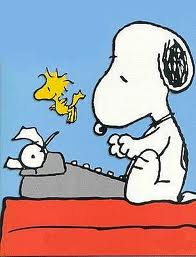 A lot of writers I know are pretty good at self-sabotage. It’s not that writing is hard, exactly, except that it is. Physical labor and exercise isn’t required, and it sure doesn’t look like you’re doing much when you’re
A lot of writers I know are pretty good at self-sabotage. It’s not that writing is hard, exactly, except that it is. Physical labor and exercise isn’t required, and it sure doesn’t look like you’re doing much when you’re I get more and more e-mails about the sources I use to write about ancient Arabia, and questions about those sources come up more and more frequently every time I turn up on a convention panel. As a result, I took a long post live on my blog today about one of my favorite books, a historical memoir from the 11th century. When I talk about any of my sources in person I can only tell you how good I think it is. One of the benefits about putting my thoughts in writing is that I can provide examples from the text to prove my point.
I get more and more e-mails about the sources I use to write about ancient Arabia, and questions about those sources come up more and more frequently every time I turn up on a convention panel. As a result, I took a long post live on my blog today about one of my favorite books, a historical memoir from the 11th century. When I talk about any of my sources in person I can only tell you how good I think it is. One of the benefits about putting my thoughts in writing is that I can provide examples from the text to prove my point.